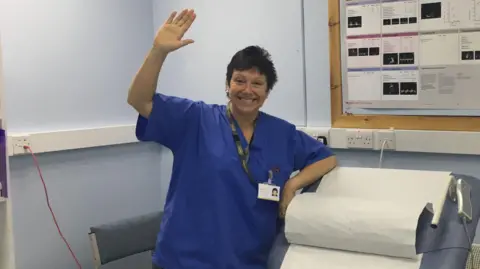 HANDOUT
HANDOUTWeight-loss drug Mounjaro is set to be rolled out on the NHS in England from March.
It is one of many weight-loss drugs that have become increasingly popular in recent years, and are sold privately by clinics and pharmacies.
BBC News spoke to people who are already paying to access Mounjaro, or are hoping to access it through the NHS, about their views on the announcement.
Alix Harvey, 35
 HANDOUT
HANDOUTAlix Harvey, a 35-year-old marine biologist from Plymouth, welcomed the move to increase access to the weight-loss drug.
She started taking Mounjaro in May after struggling with weight gain following the birth of her two children.
“I got to the stage where I went ‘if this continues, I’m going to end up morbidly obese in my late 30s’,” she said.
In the last six months, her body mass index (BMI) has fallen from 32 to 22, while she has lost 25% of her body weight.
According to the NHS, those with a BMI of 25 and over are in the overweight range, while those with a BMI of 30 and over are classed as obese.
“It’s changed my life… It’s completely changed my attitude to food,” she said, adding that she also had felt motivated to go to the gym and take up weightlifting.
Because Mounjaro works as an appetite suppressant, she said she struggled to eat more than 1,000 calories initially but the effects had “decreased” and her appetite had increased again.
Ms Harvey has spent about £170 a month on the drug, but said she had saved the same amount in buying less food and drink and planned to stop taking it.
She would not be eligible for the drug under the NICE guidelines, which stipulate that Mounjaro will be offered to people with a BMI of more than 35 and at least one obesity-related health problem.
But she believes rollout should be gradual to ensure support is in place alongside the drug, which carries the risk of users putting the weight back on once they stop taking it.
“It’s not a quick fix,” she said. “Having that maintenance plan for afterwards for supporting people to keep that weight off afterwards is really vital.”
Jane Graham, 60
 HANDOUT
HANDOUTCardiac physiologist Jane Graham, from York, said she hoped to access a weight-loss jab through the NHS to lose two stone (12.7kg).
The 60-year-old had a heart attack nine years ago, and alongside being at high risk for further heart attacks, is pre-diabetic.
“My arms and legs aren’t fat, just the middle of my body – which is where the risks [for heart-related health issues] lie,” she said. “My waist is 42 inches [106cm] but I weigh 12 stone [76.2kg] and I can’t get it off.”
Ms Graham said she had “tried everything” to lose weight, including the calorie-restricting 5:2 diet and reading nutrition books “until I’m blue in the face”.
“The fight’s gone out of me because I’ve tried for so long,” she said, but added that she was “worried” that her health issues will worsen.
While she would like to try Mounjaro, she would like to be supervised by medics as part of the NHS programme due to her pre-existing health issues.
“I would be quite happy to pay for it but be supervised, but you can’t do that. It’s either one or the other,” she said.
She was deeply disappointed that with a BMI of 30, she will not qualify for the drug under the NICE guidelines.
And, even if she did fall into the catchment criteria, Ms Graham was concerned about the potential wait to access Mounjaro.
“By the time I’ve waited 12 years… I’ll be 72 and whatever is going to happen to me will have happened. It’s going to be too late.”
NICE has given the NHS more than a decade to introduce the drug because of concerns it could overwhelm services.
NICE chief medical officer Prof Jonathan Benger acknowledged that this would mean “many people would have to wait”.
But he added: “We’ve had to make this difficult decision in order to protect vital NHS services and also to test ways of delivering this new generation of weight-loss medications.”
Paul, 53
Paul – who did not want to share his last name – and his wife have been taking Mounjaro over the past few months that they bought from a private online clinic.
“My wife and I don’t drink, don’t smoke but we do like to eat and we were both very overweight,” he said.
His wife has lost 5 stone (31.7kg) since starting in July, while Paul said he had also lost weight since starting in October.
Paul, who said that at his heaviest he weighed 20 stone (127kg), said he had “tried everything” to lose weight.
“But I found the weight would just not come off. It was demoralising,” he said.
He spoke with his GP, he said, but decided to try Mounjaro after hearing about success stories.
The drug, Paul said, had helped get rid of the “food voice” telling him he is hungry all the time.
His wife pays £180 per month for a private prescription and he has been using some of her medication – now that she needs less of it having lost some weight – because they can’t afford for him to buy his own too.
Paul has not sought advice on sharing prescription medication, which is potentially dangerous and not recommended.
Paul said it would be great if the NHS could provide it – but that a 12-year wait for some is “too long”.
He accepts that it is risky taking something that has not been specifically prescribed for him and has experienced some mild side effects.
“It’s a bit of a punt. I will go back to my GP for a general check up at some point and let them know that I am on it,” he added.

